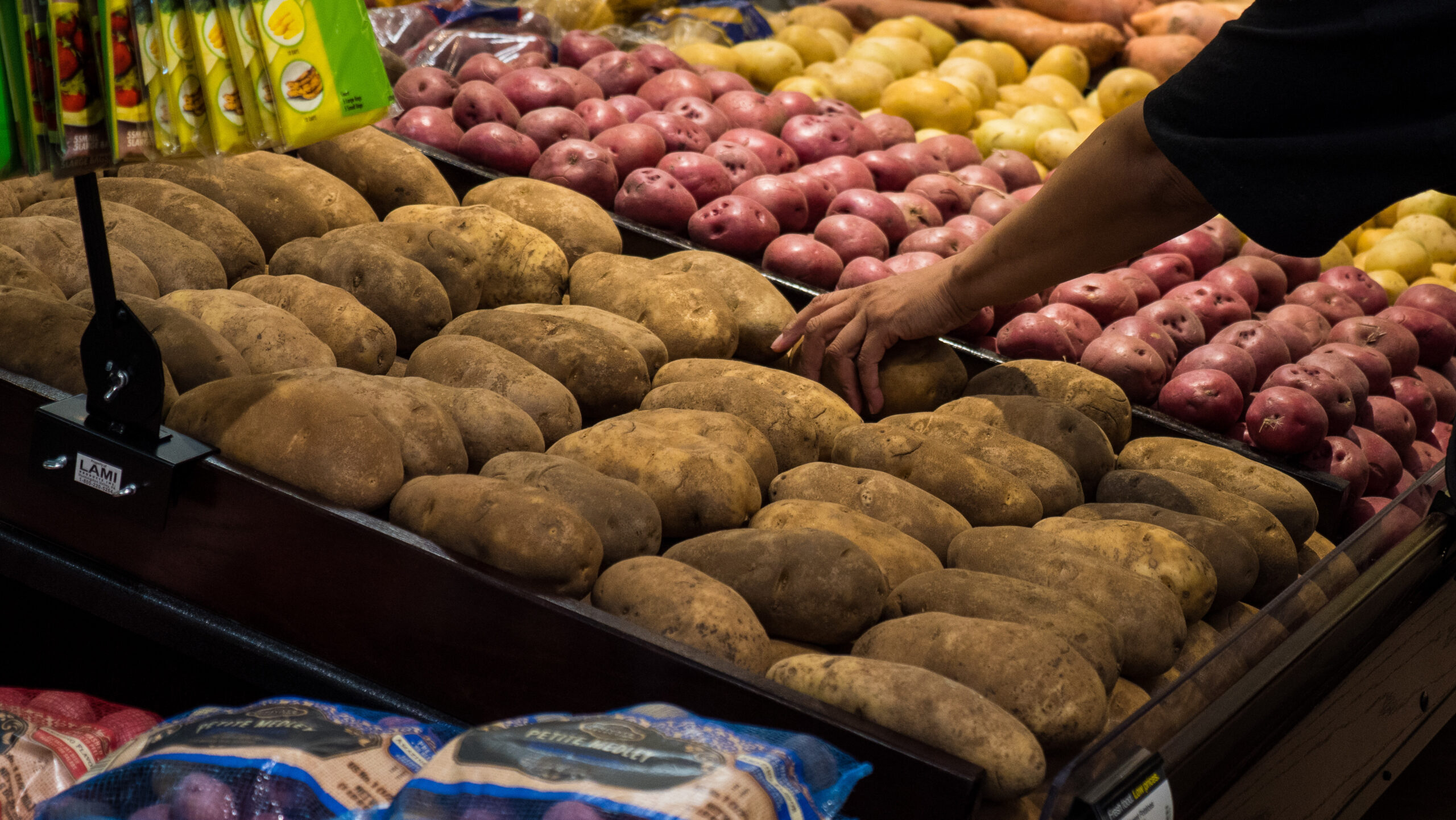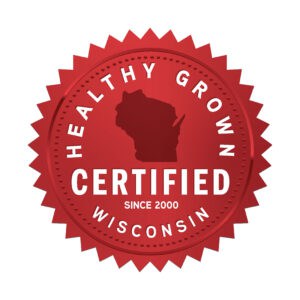Potatoes and kidney disease have long been linked with diet restrictions due to potassium levels, but new research shows that fresh, whole potatoes can be part of a kidney-friendly diet. While processed foods with potassium additives raise concern, potatoes provide fiber, vitamin C, magnesium and resistant starch that support overall health. Preparation methods such as boiling, soaking, or cooling can further reduce potassium content, making potatoes an option for many patients with chronic kidney disease. With guidance from a registered dietitian nutritionist, potatoes can support kidney health and fit within a balanced diet.
by: Jenny Heap, MS, RDN
Potatoes and Kidney Disease: Why the Concern?
For many years, it was thought that whole foods like avocados, bananas, potatoes, and tomatoes – due to high potassium and phosphorus content – needed to be restricted across the board for individuals with chronic kidney disease. Because kidneys filter excess potassium from the blood, reduced kidney function can result in hyperkalemia – dangerously high levels of potassium in the blood. However, recent research questions the effectiveness of restricting these foods and in many cases, the wisdom of doing so. [i] [ii] [iii] [iv] In fact, it is now understood that diets rich in fruits and vegetables – including potatoes – not only protect cardiometabolic health but can also help slow the progression of kidney disease. [v]
Cardiovascular-Kidney-Metabolic (CKM) Syndrome
According to the American Heart Association, one in three adults in the US have three or more risk factors that lead to cardiovascular disease, metabolic disorders, and kidney disease: elevated weight, blood pressure, cholesterol, blood glucose, and triglycerides. The trifecta is so interrelated that it’s now referred to as cardiovascular-kidney-metabolic (CKM) syndrome. Plant-based diets – such as Mediterranean, vegetarian, and vegan approaches in addition to DASH (Dietary Approaches to Stop Hypertension) – are widely recommended to support cardiometabolic health. Therefore, it is thought that personalizing and liberalizing diets for those with reduced kidney function could be especially beneficial for cardiometabolic health.
Why Potatoes for CKM health?
Vitamin C: 20mg; 30% of the Daily Value
It’s thought that vitamin C might help prevent atherosclerosis, hypertension, and stroke [vi] and may be particularly related to blood pressure. A 2020 meta-analysis showed serum vitamin C levels to be significantly lower in study participants with hypertension vs. those with normal blood pressure.[vii] Vitamin C is also a topic of rising interest for diabetes researchers. Studies show that diabetes increases vitamin C requirements and that higher intakes might help improve both blood pressure and glycemic control.[viii]
Vitamin B6: 0.2mg; 10% of the Daily Value
This B vitamin is known to play an important role in carbohydrate metabolism, but it doesn’t stop there. There is ample evidence to suggest that serum levels of vitamin B6 are inversely related to T2D and its progression.[ix]
Magnesium: 46.7mg; 11% of the Daily Value
Potatoes are a significant source of magnesium in Americans’ diets, with an estimated 5% coming from potatoes.[x] Magnesium helps regulate blood pressure and blood glucose levels.
Magnesium insufficiency is common in T2D and is thought to worsen insulin sensitivity.[xi] A new retrospective analysis of NHANES data (1999-2018) found that higher intakes of dietary fiber and magnesium were associated with reduced long-term risk of cardiovascular death and death from all causes in people with T2D.[xii]
Dietary Fiber: 2g; 7% of the Daily Value
The fiber in potatoes helps slow digestion and absorption of carbohydrates, helping to blunt the glucose response. Fiber also enhances satiety, contributes to bowel regularity, and may have beneficial effects on the gut microbiome. Systematic reviews suggest that total dietary fiber intake is associated with a reduced risk of both diabetes[xiii] and cardiovascular disease[xiv].
Fiber is the only nutrient significantly reduced when a potato is peeled. Nearly 50% of the fiber is found in the skin, so leave the peel on to optimize cardiometabolic benefits.
Are Potatoes Bad for Kidney Disease? New Evidence Says Otherwise
A 2021 systematic review looking at the association of dietary patterns and the development and progression of chronic kidney disease (CKD) concluded that dietary patterns emphasizing intake of fruits, vegetables, and dietary fiber are protective of kidney health and associated with lower incidence and progression of CKD. Reduction of salt, sweets, fats, and protein also appeared protective of kidney health. [xv] For healthy people and those with early-stage kidney disease, diets high in foods naturally rich in potassium such as fruits and vegetables are encouraged to help prevent disease progression and protect cardiometabolic health. [xvi]
The 2024 update to the KDIGO guidelines for dietary management of hyperkalemia emphasizes the importance of registered dietitian nutritionists (RDNs) in providing personalized dietary counsel based on disease state and individual nutrition needs. Working alongside the medical team, RDNs can provide guidance on preventing and managing hyperkalemia via diet. [xvii] While it is critically important for those with chronic kidney disease to watch and closely manage potassium levels, the relative impact of limiting healthy, whole foods is now better understood and research suggests that the benefits of including these foods outweigh perceived risks.
Practical Tips for Managing Potassium Intake
The following strategies are thought to be most practical and impactful for preventing and managing hyperkalemia.[xviii]
- Avoiding highly bioavailable potassium from processed foods and potassium additives: Potassium from foods like fruits and vegetables is part of the food matrix and is less readily available during digestion. In contrast, potassium from food additives like potassium chloride (often added to low-sodium foods) can more quickly raise blood potassium levels due to high levels and easy absorption.
According to the KDIGO clinical practice guidelines updated in 2024, reduction of processed foods rich in highly-bioavailable potassium – such as salt substitutes, processed meats, powdered drink mixes, electrolyte beverages, processed low-sodium foods – should be encouraged vs. limiting fresh, potassium-rich whole foods for hyperkalemia management.[xix]
While nearly all of the potassium in food additives is absorbed by the body, less than 60% is absorbed from potassium-rich whole foods.[xx] The following additives should be viewed with caution: potassium chloride, potassium lactate, potassium citrate, potassium phosphate.
- Reviewing medications: Many medications can impact potassium levels and potentially cause or worsen hyperkalemia, so it is important to review medications with a physician and work closely with the medical team.
- Managing blood sugar levels: Because elevated blood sugar levels can also contribute to hyperkalemia, managing blood sugar is critical to managing potassium levels.
- Managing blood acidity: The acidity of the blood can also impact potassium levels, with higher acid contributing to elevated potassium. Eating fruits and vegetables can help manage blood pH and support kidney function by neutralizing acid in your blood.
- Managing intestinal transit time: Potassium is absorbed in the large intestine, and the longer food waste is present in the large intestine, the more potassium is absorbed. Fiber from diets high in fruits and vegetables helps manage constipation and regulate potassium absorption.
How to Prepare Potatoes for a Kidney-Friendly Diet
For cases in which the medical team agrees that further potassium reduction is necessary via limiting whole food sources, potassium in potatoes can be significantly reduced (by up to 70-90% in some cases) via double cooking (discarding water between boils) [xxi] or using the following methods [xxii]:
- Fresh potatoes
- Peel potato and cut into thin strips
- Boil in water for 8 minutes
- Drain and replace with fresh water
- Soak for 12 hours
- Drain and prepare as desired
- Canned potatoes
- Drain potatoes
- Soak in fresh water for 12 hours
- Drain and prepare as desired
- Frozen French fries
- Rinse and drain
- Soak in water for 12 hours
- Drain and prepare as desired (Frying will reduce moisture, and therefore increase the potassium per gram, but soaking the fries first will greatly reduce the potassium content.)
In conclusion, managing blood potassium levels is essential to prevent hyperkalemia in those with impaired kidney function. Current recommendations emphasize the importance of avoiding highly bioavailable potassium from processed foods and additives, close medication management, managing blood sugar levels, managing blood acidity, and regulating intestinal transit time. Using these strategies to prevent and manage hyperkalemia while encouraging healthy dietary patterns rich in whole foods like potatoes is indicated to support kidney longevity and cardiometabolic health.
The Role of Dietitians in CKD Nutrition Guidance
NOTE: Information shared in this article is for general educational purposes. Diets for those with CKD should be individualized with the help of a registered dietitian nutritionist who can make recommendations based on an individual’s disease state, responsiveness to diet therapy, and other nutritional needs.
Explore more at eatwisconsinpotatoes.com.
Content produced in partnership with the Wisconsin Potato and Vegetable Growers Association. Wisconsin Potato and Vegetable Growers Association represents growers committed to good agriculture, food safety, nutrition, traceability and providing America with fresh, high-quality produce.
Wisconsin-grown potatoes offer more than just great taste. Local and sustainably sourced, they’re packed with nutrition no matter the variety.
Every one of our Wisconsin Healthy Grown® farms is certified by an independent oversight organization. They ensure our growers pass annual Wisconsin Healthy Grown® Potatoes and Vegetables whole-farm audits, and that all our packers and shippers maintain the highest sustainability standards.
Look for the Wisconsin Healthy Grown® certification.
[i] Bernier-Jean A,Wong G, Saglimbene V, et al. Dietary potassium intake and all-cause mortality in adults treated with hemodialysis. Clin J Am Soc Nephrol. 2021;16:1851-1861.
[ii] Ramos CI, Gonzalez-Ortiz A, Espinosa-Cuevas A, Avesani CM, Carrero JJ, Cuppari L. Does dietary potassium intake associate with hyperkalemia in patients with chronic kidney disease? Nephrol Dial Transpl. 2021;36:2049-2057.
[iii] St-Jules DE, Goldfarb DS, Sevick MA. Nutrient non-equivalence: does restricting high-potassium plant foods Help to prevent hyperkalemia in hemodialysis patients? J Ren Nutr. 2016;26:282-287.
[iv] Babich JS, Kalantar-Zadeh K, Joshi S. Taking the Kale out of hyperkalemia: plant foods and serum potassium in patients with kidney disease. J Ren Nutr. 2022;32:641-649.
[v] Quintela BCSF, Carioca AAF, de Oliveira JGR, Fraser SDS, da Silva Junior GB. Dietary patterns and chronic kidney disease outcomes: A systematic review. Nephrology (Carlton). 2021;26(7):603-612. doi:10.1111/nep.13883
[vi] Morelli MB, Gambardella J, Castellanos V, Trimarco V, Santulli G. Vitamin C and Cardiovascular Disease: An Update. Antioxidants (Basel). 2020;9(12):1227. Published 2020 Dec 3. doi:10.3390/antiox9121227
[vii] Ran L, Zhao W, Tan X, et al. Association between Serum Vitamin C and the Blood Pressure: A Systematic Review and Meta-Analysis of Observational Studies. Cardiovasc. Ther. 2020, 2020, 4940673
[viii] Mason SA, Parker L, van der Pligt P, Wadley GD. Vitamin C supplementation for diabetes management: A comprehensive narrative review. Free Radic Biol Med. 2023 Jan;194:255-283. doi: 10.1016/j.freeradbiomed.2022.12.003. Epub 2022 Dec 14. PMID: 36526243.
[ix] Mascolo E, Vernì F. Vitamin B6 and Diabetes: Relationship and Molecular Mechanisms. Int J Mol Sci. 2020 May 23;21(10):3669. doi: 10.3390/ijms21103669. PMID: 32456137; PMCID: PMC7279184.
[x] Beals, K.A. Potatoes, Nutrition and Health. Am J Potato Res. 2019;96:102–110. https://doi.org/10.1007/s12230-018-09705-4
[xi] Barbagallo M, Dominguez LJ. Magnesium and type 2 diabetes. World J Diabetes. 2015 Aug 25;6(10):1152-7. doi: 10.4239/wjd.v6.i10.1152. PMID: 26322160; PMCID: PMC4549665.
[xii] Wang F, Mao Y, Sun J, Yang J, Xiao L, Huang Q, Wei C, Gou Z, Zhang K. Models based on dietary nutrients predicting all-cause and cardiovascular mortality in people with diabetes. Sci Rep. 2025 Feb 7;15(1):4600. doi: 10.1038/s41598-025-88480-9. PMID: 39920222; PMCID: PMC11805981.
[xiii] InterAct C. Dietary fibre and incidence of type 2 diabetes in eight European countries: the EPIC-InterAct study and a meta-analysis of prospective studies. Diabetologia. 2015;58:1394–408.
[xiv] Threapleton DE, Greenwood DC, Evans CE, Cleghorn CL, Nykjaer C, Woodhead C, Cade JE, Gale CP, Burley VJ. Dietary fibre intake and risk of cardiovascular disease: systematic review and meta-analysis. BMJ. 2013;347:f6879.
[xv] Quintela BCSF, Carioca AAF, de Oliveira JGR, Fraser SDS, da Silva Junior GB. Dietary patterns and chronic kidney disease outcomes: A systematic review. Nephrology (Carlton). 2021;26(7):603-612. doi:10.1111/nep.13883
[xvi] Kidney Disease: Improving Global Outcomes (KDIGO) CKD Work Group. KDIGO 2024 Clinical Practice Guideline for the Evaluation and Management of Chronic Kidney Disease. Kidney Int. 2024;105(4S):S117-S314. doi:10.1016/j.kint.2023.10.018
[xvii] Sumida K, Biruete A, Kistler BM, et al. New Insights Into Dietary Approaches to Potassium Management in Chronic Kidney Disease. J Ren Nutr. 2023;33(6S):S6-S12. doi:10.1053/j.jrn.2022.12.003
[xviii] Sumida K, Biruete A, Kistler BM, et al. New Insights Into Dietary Approaches to Potassium Management in Chronic Kidney Disease. J Ren Nutr. 2023;33(6S):S6-S12. doi:10.1053/j.jrn.2022.12.003
[xix] Kidney Disease: Improving Global Outcomes (KDIGO) CKD Work Group. KDIGO 2024 Clinical Practice Guideline for the Evaluation and Management of Chronic Kidney Disease. Kidney Int. 2024;105(4S):S117-S314. doi:10.1016/j.kint.2023.10.018
[xx] Kidney Disease: Improving Global Outcomes (KDIGO) CKD Work Group. KDIGO 2024 Clinical Practice Guideline for the Evaluation and Management of Chronic Kidney Disease. Kidney Int. 2024;105(4S):S117-S314. doi:10.1016/j.kint.2023.10.018
[xxi] Burrowes JD, Ramer NJ. Changes in potassium content of different potato varieties after cooking. J Ren Nutr. 2008;18(6):530-534. doi:10.1053/j.jrn.2008.08.005
[xxii] Martínez-Pineda M, Yagüe-Ruiz C, Vercet-Tormo A. Is It Possible to Include Potato in the Diet of Chronic Kidney Disease Patients? New Culinary Alternatives for Limiting Potassium Content. J Ren Nutr. 2020;30(3):251-260. doi:10.1053/j.jrn.2019.07.001
v Quintela BCSF, Carioca AAF, de Oliveira JGR, Fraser SDS, da Silva Junior GB. Dietary patterns and chronic kidney disease outcomes: A systematic review. Nephrology (Carlton). 2021;26(7):603-612. doi:10.1111/nep.13883
vi Morelli MB, Gambardella J, Castellanos V, Trimarco V, Santulli G. Vitamin C and Cardiovascular Disease:
An Update. Antioxidants (Basel). 2020;9(12):1227. Published 2020 Dec 3. doi:10.3390/antiox9121227
vii Ran L, Zhao W, Tan X, et al. Association between Serum Vitamin C and the Blood Pressure: A Systematic Review and Meta-Analysis of Observational Studies. Cardiovasc. Ther. 2020, 2020, 4940673
viii Mason SA, Parker L, van der Pligt P, Wadley GD. Vitamin C supplementation for diabetes management: A comprehensive narrative review. Free Radic Biol Med. 2023 Jan;194:255-283. doi: 10.1016/j.freeradbiomed.2022.12.003. Epub 2022 Dec 14. PMID: 36526243.
ix Mascolo E, Vernì F. Vitamin B6 and Diabetes: Relationship and Molecular Mechanisms. Int J Mol Sci. 2020 May 23;21(10):3669. doi: 10.3390/ijms21103669. PMID: 32456137; PMCID: PMC7279184.
x Beals, K.A. Potatoes, Nutrition and Health. Am J Potato Res. 2019;96:102–110. https://doi.org/10.1007/s12230-018-09705-4
xi Barbagallo M, Dominguez LJ. Magnesium and type 2 diabetes. World J Diabetes. 2015 Aug 25;6(10):1152-7. doi: 10.4239/wjd.v6.i10.1152. PMID: 26322160; PMCID: PMC4549665.
xii Wang F, Mao Y, Sun J, Yang J, Xiao L, Huang Q, Wei C, Gou Z, Zhang K. Models based on dietary nutrients predicting all-cause and cardiovascular mortality in people with diabetes. Sci Rep. 2025 Feb 7;15(1):4600. doi: 10.1038/s41598-025-88480-9. PMID: 39920222; PMCID: PMC11805981.
xiii InterAct C. Dietary fibre and incidence of type 2 diabetes in eight European countries: the EPIC-InterAct study and a meta-analysis of prospective studies. Diabetologia. 2015;58:1394–408.
xiv Threapleton DE, Greenwood DC, Evans CE, Cleghorn CL, Nykjaer C, Woodhead C, Cade JE, Gale CP, Burley VJ. Dietary fibre intake and risk of cardiovascular disease: systematic review and meta-analysis. BMJ. 2013;347:f6879.
xv Quintela BCSF, Carioca AAF, de Oliveira JGR, Fraser SDS, da Silva Junior GB. Dietary patterns and chronic kidney disease outcomes: A systematic review. Nephrology (Carlton). 2021;26(7):603-612. doi:10.1111/nep.13883
xvi Kidney Disease: Improving Global Outcomes (KDIGO) CKD Work Group. KDIGO 2024 Clinical Practice Guideline for the Evaluation and Management of Chronic Kidney Disease. Kidney Int. 2024;105(4S):S117-
S314. doi:10.1016/j.kint.2023.10.018
xvii Sumida K, Biruete A, Kistler BM, et al. New Insights Into Dietary Approaches to Potassium Management in Chronic Kidney Disease. J Ren Nutr. 2023;33(6S):S6-S12. doi:10.1053/j.jrn.2022.12.003
xviii Kidney Disease: Improving Global Outcomes (KDIGO) CKD Work Group. KDIGO 2024 Clinical Practice Guideline for the Evaluation and Management of Chronic Kidney Disease. Kidney Int. 2024;105(4S):S117-
S314. doi:10.1016/j.kint.2023.10.018
xix Kidney Disease: Improving Global Outcomes (KDIGO) CKD Work Group. KDIGO 2024 Clinical Practice Guideline for the Evaluation and Management of Chronic Kidney Disease. Kidney Int. 2024;105(4S):S117- S314. doi:10.1016/j.kint.2023.10.018
xx Burrowes JD, Ramer NJ. Changes in potassium content of different potato varieties after cooking. J Ren Nutr. 2008;18(6):530-534. doi:10.1053/j.jrn.2008.08.005
xxi Martínez-Pineda M, Yagüe-Ruiz C, Vercet-Tormo A. Is It Possible to Include Potato in the Diet of Chronic Kidney Disease Patients? New Culinary Alternatives for Limiting Potassium Content. J Ren Nutr. 2020;30(3):251-260. doi:10.1053/j.jrn.2019.07.001
About the Author:
Jenny Heap, MS, RDN, is a registered dietitian nutritionist who contributes nutrition expertise to the educational outreach of Wisconsin Potato and Vegetable Growers Association. Connect with Jenny on LinkedIn.



